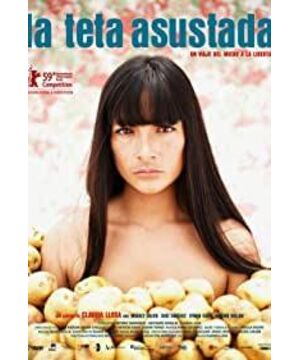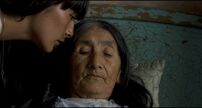"Sad Milk" is the first Peruvian film I saw. Perhaps to many people in the world, Peru is like China, mysterious and ancient, with enough room for imagination. How many people have the opportunity to go to Peru and learn about the customs of that country? Even if there are people who can go to the local area for sightseeing, it is nothing more than just watching the flowers, and who will really care about the lives of the people there.
This year's Berlin Film Festival is very interesting. In the main competition unit, there are several films that focus on human disasters, such as describing wars, describing terrorist attacks, and describing terrorist centralization, but they do not directly face the disaster itself, but discuss the consequences of disasters 's calamity. "Sad Milk" is also such a film, it tells the lingering pain and resentment among the people after the end of Peru's horrific authoritarianism in 2000. The whole film revolves around Fasta, a young Peruvian girl from a poor family. Fasta is very attractive and looks like an empty but stubborn abused doll. In Peru during the terrorist strife, women who were abused or raped developed a mysterious disease that Fasta's mother unfortunately contracted. Fasta also fell ill from drinking his mother's milk, known as the "milk of sadness". Fasta's mother was seriously ill and died forever, but Fasta was deeply afraid of it. She is afraid of death, on the one hand for her mother's passing away, and on the other for her unpredictable future.
Fasta was introduced to work as a maid in the house of the female pianist. The female pianist suffered a downturn in her career, her mood was ups and downs, and she even damaged the piano at home to vent her anger. Fasta has an ambiguous relationship with the man who occasionally comes to the master's house as a gardener, and friends around her brother also inexplicably like her, but Fasta concentrates on how to fight the disease. In order to cure the disease, she stuffs potatoes with potatoes. into the vagina.
The spiritual songs that Fasta hummed by chance were deeply in the mind of the female pianist, who sang it again and again with Pearl De Fasta. Unexpectedly, the female pianist stole Fasta's songs, and she performed to great effect and achieved career success. But she immediately abandoned Fasta mercilessly, berating her for leaving herself. Fasta feels sad, and feels lonely in addition to her fear. For a helpless woman like her, government power, unstable social factors and the persecution of her by the rich are all the same.
At the beginning of the film, it is the funeral of Fasta's mother. Since then, their family has continued many inexplicable, absurd but simple weddings. Fasta's fate is intertwined with funerals and weddings, and when she returns home from her dismissal, she is greatly comforted by the joy of the children's swimming in the pits. The flowers she kept also bloomed in surprise, and for her, the haze of fear seemed to be swept away.
Milk has always been sweet and is closely related to reproduction, motherhood, nurture and even growth. But in this movie, milk has become a channel for disease transmission and the root cause of Fasta's disease. Although the days of terror in Peru are a thing of the past, Fasta has suffered, not only from the physical damage to her by an inexplicable disease, but also from the fear of the disease itself and the fear of death.
Maybe this movie is a window that God secretly opened, allowing people from different regions and cultures to communicate. Seeing Fasta walking home from the long stairs, from the prosperous land to the barren and crowded, is like a once ignorant human being going to the kingdom of heaven in search of true knowledge. As Tilda said: "A person looks at the screen in a dark place, and sees the same story being played out in other parts of the world. It turns out that people in other countries and regions think the same way. The predicaments and problems of life are the same as ours. We are not alone in this world. Although some people say that life is the most important thing, this kind of encounter is more important than life to me.”
View more about La teta asustada reviews










